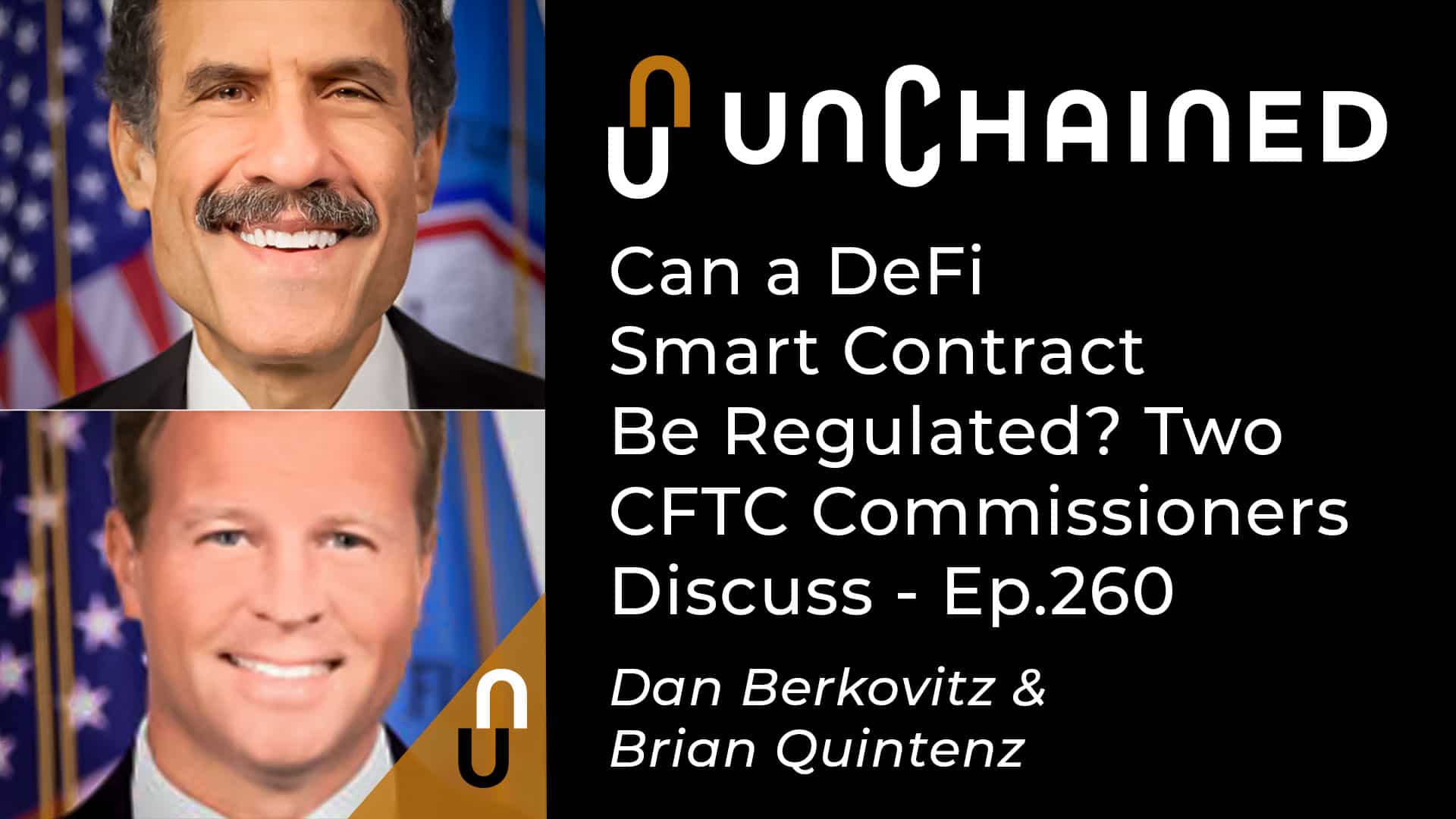CFTC Commissioners Dan Berkovitz and Brian Quintenz discuss the difficulties of regulating crypto derivatives and DeFi. Show highlights:
- their backgrounds
- what the CFTC’s duties are regarding crypto
- how the CFTC’s jurisdiction has evolved over the years
- why Commissioner Quintenz believes SEC Commissioner Hester Peirce’s safe harbor proposal is “brilliant”
- what relationship the CFTC and SEC have when making decisions on crypto assets
- why the commissioners believe CFTC’s complaints regarding BitMEX are “well-founded”
- why formal regulation for crypto derivatives is unlikely to be produced by the CFTC
- why leveraged derivatives products are a “concern” to the CFTC
- what makes regulating DeFi platforms so difficult
- when it comes to DeFi, who is a natural entity for the CFTC to regulate, if any
- whether the CFTC would ever go after DeFi “market participants,” who the CFTC also regulates
- why smart contracts involving futures could be illegal
- how the possibility that smart contracts could be illegal squares with the view that software development is a form of free speech
- whether the CFTC could prosecute developers who write smart contracts
- whether the CFTC needs to re-write its laws in light of DeFi innovation
- why Commissioner Berkovitz thinks the DeFi “winners” will be protocols that focus on meeting regulatory requirements
- why the CFTC approved Bitcoin futures in 2017 while the SEC has not yet approved a Bitcoin ETF
- how a Bitcoin ETF could solve Bitcoin’s accounting issue, which currently gives companies no upside for adding BTC to its balance sheet
https://youtu.be/AOwCYD2HoJM
Thank you to our sponsors!
Crypto.com: https://crypto.onelink.me/J9Lg/unchainedcardearnfeb2
Conjure: https://conjure.finance
Episode Links
People
Dan Berkovitz, CFTC Commissioner (Sep 2018+)
- CFTC website: https://www.cftc.gov/About/Commissioners/CommissionerDanMBerkovitz/index.htm
- Twitter: https://twitter.com/CFTCberkovitz
Brian Quintenz, CFTC Commissioner (Aug 2017+)
- CFTC website: https://www.cftc.gov/About/Commissioners/BrianQuintenz/index.htm
- Twitter: https://twitter.com/CFTCquintenz
Related Links
- CFTC digital asset resources: https://www.cftc.gov/digitalassets/index.htm
- Commissioner Berkovitz DeFi speech: https://www.theblockcrypto.com/linked/107769/cftc-commissioner-criticizes-defi-decries-lack-of-intermediaries
- Commissioner Quintenz smart contracts/blockchain speech: https://www.cftc.gov/PressRoom/SpeechesTestimony/opaquintenz16
- CFTC jurisdiction over digital assets: https://www.cftc.gov/PressRoom/SpeechesTestimony/giancarlostatement010418
- CFTC BitMEX complaint: https://www.cftc.gov/PressRoom/PressReleases/8270-20
- FTX and Binance remove high leverage: https://decrypt.co/76858/ftx-and-binance-remove-high-leverage-from-exchanges
- SEC Commissioner Hester Peirce’s safe harbor proposal: https://www.sec.gov/news/public-statement/peirce-statement-token-safe-harbor-proposal-2.0
Bitcoin futures approval from CFTC in 2017: https://www.businessinsider.com/bitcoin-price-futures-trading-exchanges-cftc-2017-12



